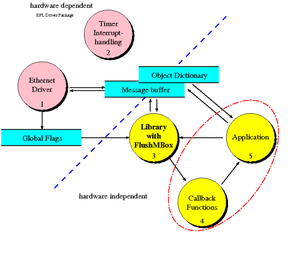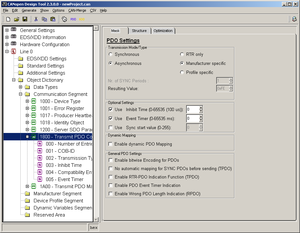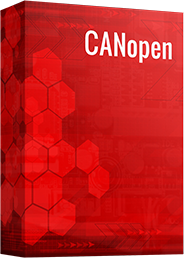We use cookies to make your experience better. To comply with the new e-Privacy directive, we need to ask for your consent to set the cookies. Learn more.
Description

The CANopen Library consists of a hardware independent and a hardware dependent part that communicate with message queues. The hardware dependent part consists of controlling software for the CAN controller and timer functions. A detailed description can be found in the CANopen Driver Package.
The application communicates only with the hardware independent part of the CANopen Library. That way it is possible to exchange drivers without any influence on the functionality of the application. The initialization of CANopen services is done with function calls within the application. During the execution of the application the CANopen Library executes all necessary communication tasks autonomously and informs the application about CANopen messages with the help of callback functions.
Communication requests from other devices as well as necessary periodical tasks and time out monitoring is handled within the CANopen Library. All requests are proved for correctness (access rights, data types etc.). The application is notified after completion of the communication and occurrence of failures, respectively, through service oriented callback functions. In these callback functions appropriate actions can be carried out from the application.
The object directory is designed to contain references to the variables in the user application. Consequently it is possible to take over variables from an existing software without any changes in the object dictionary.
The high degree of scalability of the CANopen Library is of particular importance for devices with limited resources. On one hand, this is achieved by the modularity in individual service groups, like sdo.c, pdo.c, ...sync.c, and on the other hand, through the use of compiler directives in the respective modules.
Thus, the code size is proportional to the utilized CANopen services.
Furthermore, variants of the CANopen Library for the support of multiple CAN lines (max.255) are available. Therefore it is possible to serve several independent CAN networks on devices without an operating system or with an operating system. The usage of an operating system requires it to provide means of resource protection mechanisms. Each line holds its own object directory and can be used as master and slave, respectively, independent of the other lines. Owing to the separation of the protocol stack and the hardware drivers, the individual lines can also be operated with different CAN controllers.
Delivery of the CANopen Library comprises different example programs that describe the usage of the various CANopen services. All examples contain a complete implementation of a CANopen device including the object directory as well as application code. These are ready to be compiled and run.
Among the detailed documented source code there is the reference manual and an a printed user manual, numbering 200 pages, as documentation of the CANopen Library available.
The CANopen Library is constantly improved and adopted to customer requirements. In order to keep up with the latest version of the CANopen Library port provides its customers an update service.
For development, test and initial operation of CANopen devices port provides a comprehensive tool chain. The creation of the object directory is simplified with the CAN- open Design Tool (CANopen Design Tool Light version belongs to the scope of delivery).

The graphical CANopen Design Tool is available for the creation of the object directory, the electronic data sheet (EDS file) and for the documentation of the device in HTML or text format.
The CANopen Device Monitor can be utilized for commissioning, but also for the implementation and test phase. As a fully implemented CANopen master the CANopen Device Monitor with a graphical user interface assures access to all services in the network and also allows analysis of the bus traffic.
For the development of CAN application monitoring and analyzing the CAN bus traffic is essential. The service oriented display of CANopen messages of the CAN-REport allows easy and quick interpretation of CANopen messages.
Besides the communication objects of the CiA 301 several application objects in different device profiles are also specified in CANopen. These definitions guarantee a defined behavior of the corresponding device class and enable the interchangeability of CANopen devices.
For these different device profiles port provides extension modules as an add-on to the CANopen Library. These modules allow the customization of an application based on the CANopen standards.
All modules are available in ANSI-C source code and can be used with all versions of the CANopen Library.
Please have a look at the information of the data sheet CAN- open-Library Extension modules.
Application
The CANopen Library is based on ground of the communication profile CiA 301 V4.1 of the CiA e.V. "CANopen Application Layer and Communication Profile" and EN50325-4 , respectively, and provides all services specified therein. It is completely written in ANSI-C and can be compiled with every ANSI-C compliant compiler.
Depending on the required scope of functionality the CANopen Library is available in different expansion stages. For development of small sensors and actuators with limited CAN- open services the Slave Small-Version is available. Its limitations are composed of a restricted number of service instances and no support for the CANopen services SYNC and TIME.
With the Slave-Version of the CANopen Library all services are provided for development of full-featured slave devices.
The functionality of the network management master as well as the comfortable node monitoring functionality is provided by the Master/Slave-Version, which of course contains the services of the Slave-Version.
Additional services of other communication profiles (CiA 3xx) are provided by means of extension modules.
All versions of the CANopen Library are compatible to each other and are constantly tested with the
current CANopen Conformance Test for compliance with the standard.
Slave | Master/Slave | Extra Package | |
SDO Server | 128 | 128 | |
SDO Client | 128 | 128 | |
SDO Segmented Transfer | √ | √ | |
SOD Block Transfer | √ | ||
Dyn. SDO Slave | √ | ||
SDO Manager | √ | ||
Program Download | √ | √ | |
PDO Consumer | 512 | 512 | |
PDO Producer | 512 | 512 | |
Dynamic Mapping | √ | √ | |
Bitwise Mapping | √ | √ | |
MPDO Source Mode | √ | ||
MPDO Dest. Mode | √ | ||
Nodeguarding Master | √ | √ | |
Nodeguarding Slave | √ | √ | |
Lifeguarding | √ | √ | |
Heartbeat Consumer | 128 | 128 | |
Heartbeat Producer | √ | √ | |
EMCY Consumer | 128 | 128 | |
EMCY Producer | √ | √ | |
Time Consumer | √ | √ | |
Time Producer | √ | ||
SYNC Consumer | √ | √ | |
SYNC Producer | √ | ||
NMT Slave | √ | √ | |
NMT Master | √ | ||
NMT Flying Master | √ | ||
Bootup Procedure | √ | ||
Configuration Manager | √ | ||
LED Indicator | √ | √ | |
Safety Communication | √ | ||
Redundancy Support | √ | ||
LSS Services | √ | √ | |
CiA 401 Framework | √ | ||
Nonvolatile Storage | √ | √ |
All hardware specific parts are decoupled from the CANopen protocol stack through a defined driver interface. This provides easy adaptation to different hardware platforms. The user application communicates with the CANopen Library through function calls and call-back functions. Configuration and scaling of the CANopen Library is done with the help of the CANopen Design Tool, which is delivered as CANopen Design Tool Light version. With it the CANopen Library can be tailored to an optimum to the available resources of the application. Besides the creation of the object directory all settings for the hardware can be carried out with it.
System environment
The CANopen Library runs on targets with and without operating systems. It supports many of the available CAN controllers and many microcontrollers/processors. For detailed information see data sheet CANopen Driver Package.
For systems based on Windows™ the CANopen Library is also available a Dynamic Link Library (DLL). This DLL is available for special hardware boards and contains all services of the Master/Slave standard edition of the library. It can be used to create master or slave applications.
Furthermore CANopen-Starter Kits and a free CANopen Evaluation software on CD are available on request.
Ordering Information
- 0564/12 CANopen-SRCLIB Slave - Single Line
- 0564/10 CANopen-SRCLIB Master/Slave - Single Line
- 0564/15 CANopen-SRCLIB Slave - Multi Line
- 0564/13 CANopen-SRCLIB Master/Slave - Multi Line
- 0910/xx CANopen-DLL Master/Slave
- 0564/90 CANopen-SRCLIB User Manual (Paperback)
- 0571/10 CANopen-SRCLIB Software Maintenance Agreement
- 0564/39 CANopen Evaluation-Software
- 0569/10 CANopen Training
- 0570/10 CANopen Integration Support
- 0572/01 CANopen Starter Kit for LINUX
Delivery scope
- CANopen library with separate driver interface
- CPU/CAN driver
- numerous, immediately compilable examples
- CANopen Design Tool Light
- detailed user manual
- reference manual containing descriptions of all functions including parameters and return values
Support (up to 30 days after purchase)
- support by telephone free of charge
- support by E-Mail free of charge
- update service free of charge
- With a maintenance contract will help ensure the continued support mentioned above. Please ask the current conditions in our service area.
- CANopen Design Tool Light
- generates an object dictionary and an initialization function in C-code, an Electronic Data Sheet and the documentation are produced automatically
Licensing conditions (excerpt)
For the CANopen Library a one-off license fee in the form of a product / project or site license is collected. Further license fees do not arise from the deployment of the software within the same company (no runtime licenses). It is not allowed to hand over the software and the implementation, respectively, towards a third party.
Tecnologix offers support which is directly handled by development team. Do not hesitate to get in touch with our experts.
Just ask here



